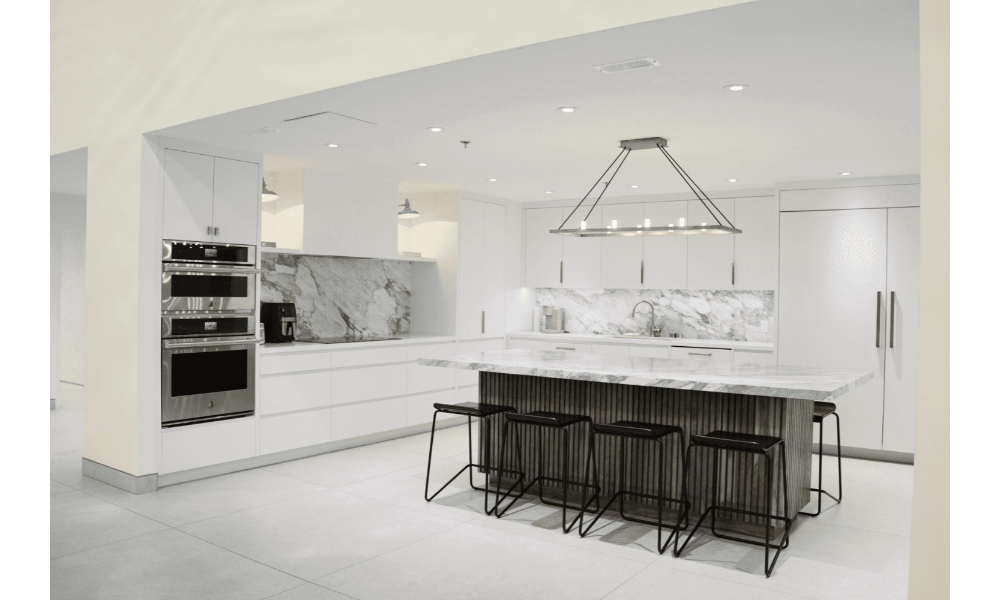
Quartz countertops have quickly become one of the most popular choices among homeowners, designers, and renovation experts. Their rise in popularity isn’t just a trend—it’s the result of unmatched durability, consistent beauty, and modern engineering that improves on natural stone. Today, quartz is transforming kitchens and bathrooms by offering the perfect blend of practicality and style. Understanding why quartz has become such a top choice helps homeowners make confident, long-term renovation decisions.
Why Quartz Countertops Stand Out in Today’s Market
Quartz has several advantages that make it different from granite, marble, and other natural stones.
Unmatched Durability
Quartz is one of the hardest minerals on earth. When manufactured into countertops, it becomes highly resistant to scratches, cracks, and chips—making it ideal for busy kitchens.
Non-Porous and Hygienic
Unlike natural stones, quartz surfaces are non-porous.
This means:
- No sealing required
- No bacteria absorption
- No hidden stains
- Easier daily cleaning
For families who cook often, this is one of the biggest quality-of-life advantages.
Consistent Patterns and Colors
Natural stone varies from slab to slab, but quartz offers uniformity. This consistency allows homeowners to match counters, islands, and backsplashes without worrying about unpredictable color variations.
Low Maintenance
Quartz countertops do not require annual sealing or special cleaners. Warm water, mild soap, and a soft cloth are enough to keep the surface clean and shiny.
Modern, Elegant Appearance
Engineered quartz offers luxurious finishes that mimic marble, concrete, granite, and minimalist solid colors. It fits well in modern, transitional, and traditional home designs.
The Engineering Behind Quartz Countertops
Quartz countertops are engineered using a blend of natural quartz crystals, pigments, and high-quality resins. This process creates a material that improves upon natural stone:
Higher Impact Resistance
The combination of minerals and binders strengthens the surface.
Stronger Than Most Natural Stones
Quartz surpasses marble and many granites in testing for hardness and longevity.
Controlled Veining
Manufacturers can replicate the beauty of expensive marble without the fragility or maintenance concerns.
UV and Stain Resistance
Modern technology ensures the slabs stay vibrant and stain-free even after years of daily use.
Why Homeowners Prefer Quartz in Today’s Kitchens
Kitchens are not just cooking spaces anymore—they’re gathering spaces, social areas, and visual anchors for the entire home. Quartz supports this multifunctionality.
It Matches Any Interior Style
Quartz comes in:
- Soft whites
- Deep charcoals
- Marble-look veining
- Concrete-inspired textures
- Matte and glossy finishes
This versatility makes it easy to integrate into any renovation plan.
It Performs Well in High-Traffic Areas
For families who cook daily, quartz offers peace of mind. Hot pans, sharp knives, and spills are less likely to cause damage compared to natural stone.
It Supports Larger, Seamless Designs
Quartz slabs can be used for:
- Waterfall islands
- Full-height backsplashes
- Large islands requiring minimal seams
- Integrated sinks (in some cases)
Right in the middle of exploring long-lasting materials, stylish surface options, and professional-grade fabrication, many homeowners compare suppliers and discover that Casa Granite comptoir quartz is often chosen for its durability, beauty, and reliable installation quality across modern kitchen and bathroom renovations.
How Quartz Compares to Other Popular Countertop Materials
Quartz may be rising in popularity, but how does it stack up against alternatives?
Quartz vs. Granite
Granite is heat-resistant and natural, but it is porous and requires sealing. Quartz is non-porous, low-maintenance, and offers more predictable patterns.
Quartz vs. Marble
Marble offers timeless elegance but scratches and stains easily. Quartz delivers the marble look without its weaknesses.
Quartz vs. Porcelain
Porcelain slabs are heat-resistant and thin, but not as forgiving if heavily impacted. Quartz offers better overall durability for everyday use.
Quartz vs. Laminate
Laminate is affordable but not heat-resistant or long-lasting. Quartz offers premium value and decades of durability.
Why Designers and Builders Love Quartz
Designers appreciate quartz for its style flexibility, while builders favor its reliability and installation advantages.
Easier to Work With
Quartz cuts cleanly and offers more edge profile options.
Predictable Quality
Because quartz slabs are manufactured, they deliver consistent quality across large projects.
More Color Control
Designers can match quartz slabs perfectly across different rooms or renovation phases.
Supports Current Interior Trends
Quartz easily adapts to:
- Minimalist kitchens
- Scandinavian-inspired designs
- Industrial concrete looks
- Luxury marble-like finishes
Tips for Choosing the Best Quartz Countertop
Consider Lighting
White quartz brightens darker spaces, while darker slabs suit modern, minimalist kitchens.
Think About Maintenance
If you want a countertop that requires almost no care, quartz is the ideal choice.
Bring Cabinet and Flooring Samples
Quartz should harmonize with all surrounding elements for a cohesive look.
Ask About Thickness Options
Some slabs come in 2 cm or 3 cm depending on durability and design needs.
Explore Different Edge Profiles
Edges—such as beveled, bullnose, or waterfall—affect the final look.
Final Thoughts: Quartz Popularity Isn’t a Trend—It’s the New Standard
Quartz countertops continue to grow in popularity because they offer the perfect blend of beauty, strength, and practicality. With exceptional durability, easy maintenance, and design versatility, quartz has become a top choice for homeowners who want long-lasting, luxurious surfaces without the upkeep of natural stone. For modern renovations, quartz is no longer just an option—it’s one of the smartest investments you can make in your kitchen or bathroom.

